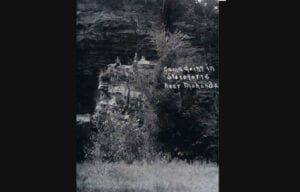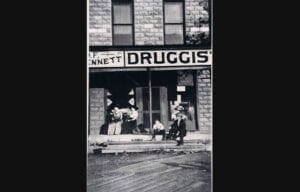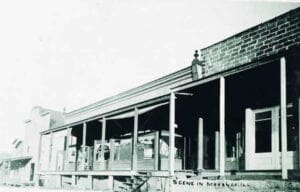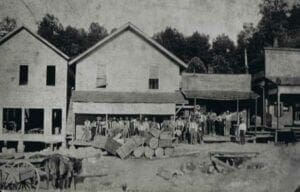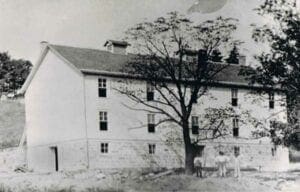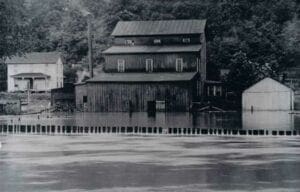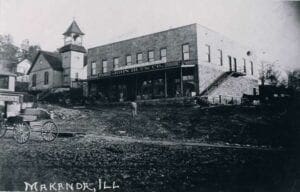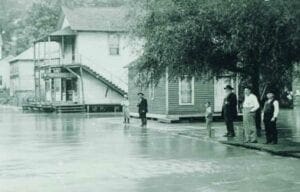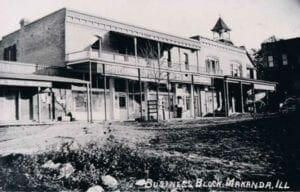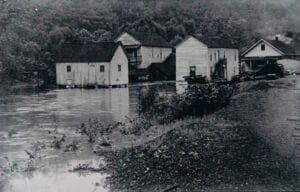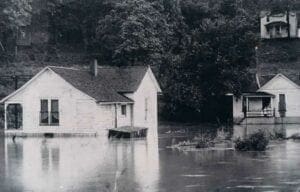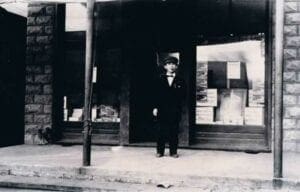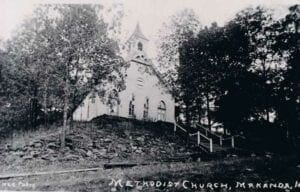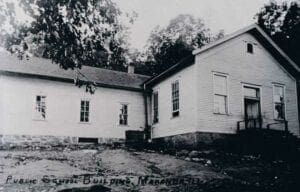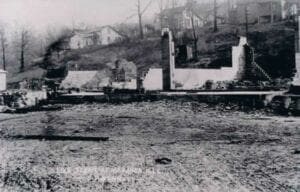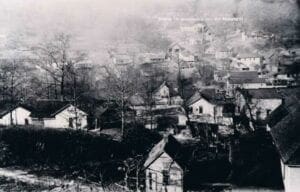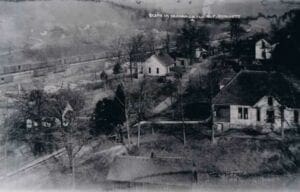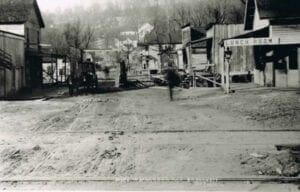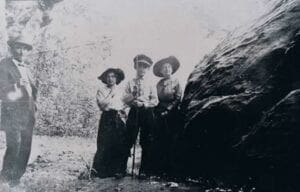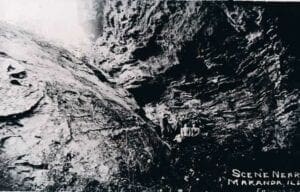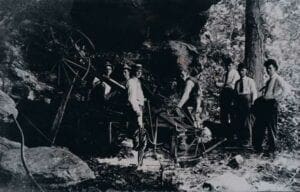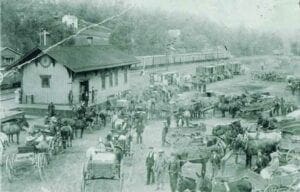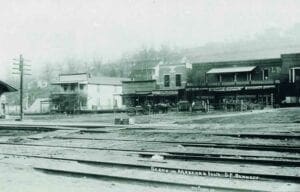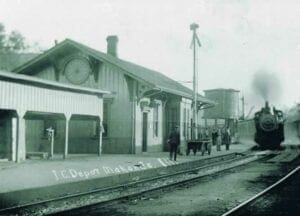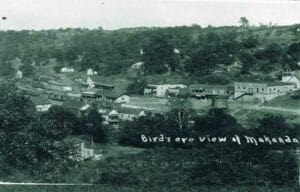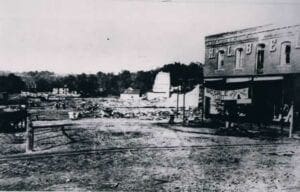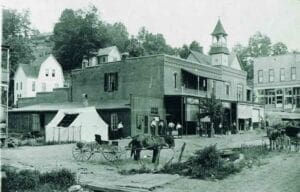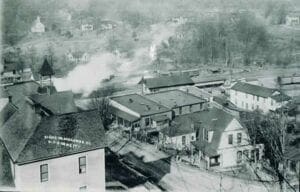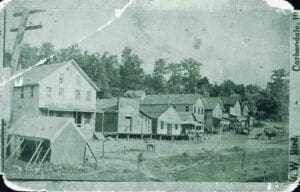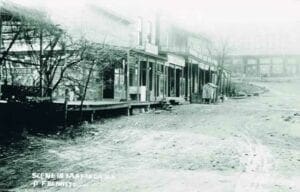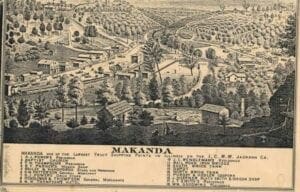Welcome to the Village of Makanda
Ask any Makanda resident what makes Makanda different and better than other surrounding towns and you'll probably hear responses like beautiful, scenic, quiet, and unlike any other town in Southern Illinois. Makanda is known for it's unique shops and businesses on the boardwalk - unlike anything else you'll find. Makanda is the Gateway to Giant City State Park with the Shawnee Hills Wine Trail and the scenic River to River Trail passing through the village.
Makanda got its start in 1845 as a boarding house and construction camp for the Illinois Central Railroad. Makanda was been known by several names of Markanda, Markands, and Markauda. In 1872, it received its present name of Makanda and was named after a local Indian chief. The village was incorporated on February 7, 1888.

The economy of Makanda was once very closely tied to the railroad. Makanda was a major shipping hub for Chicago for fruits and vegetables. The community once stretched up and down the valley and hillsides with a boardwalk extending to the entrance of Giant City State Park. Makanda was a thriving town with grocery stores, a bank, barbers, a dentist, three doctors, an undertaker, hotels, a jail, and various other establishments.
Makanda has survived multiple floods and fires that have claimed the downtown buildings such as the L. L. Bell building and also surrounding buildings and houses. Each time the town was rebuilt.
Present day Makanda has become an affordable place for artists from Southern Illinois University and the surrounding areas to create and display their work downtown on the boardwalk. Makanda is a small, thriving community and home to the Vulture Fest held the third weekend in October. The Vulture Fest features food, live music, and art.
History of Makanda
The Village of Makanda was established in 1845 and incorporated in 1888.
Former U.S. Senator and Democratic presidental candidate Paul Simon was a long time resident of Makanda. The Smiley Face Water Tower has the Simon trademark bow tie in remembrance of Simon. Upon his death in 2003, he was buried in the Rowan Cemetery in Makanda.
Makanda has a rich history which started as a camp for the Illinois Central Railroad. Below are some articles and pictures detailing Makanda's history. Click on any of the pictures below to view all Makanda historic pictures.
(North Pass News, Volume 1 Issue 6, September 20, 1979)
The community of Makanda began with the building of a boarding house and construction camp for the Illinois Central Railroad. In the earliest documents known, the valley was known as North Pass Cobden to the south was referred to as South Pass, and Alto Pass to the west was, of course, known as West Pass. Through each ran a line of the railroad. By 1857 the name had changed to Markanda or Markands; historians are not certain. When the first official postmaster came to town in 1870 the name was Markauda. In 1872, it received its present name which allegedly was the name of the Indian chief last inhabiting the section. The village incorporated on February 7, 1888.
The prosperity of the community was tied closely to that of the railroad. Fortune offered the advantage of being only one day’s train ride from the market of Chicago. As such Makanda became a major shipping point for fruits, vegetables and flowers. Residents living today can even remember the major shipments of green onions, asparagus, rhubarb, strawberries, raspberries, tomatoes, sweet peppers, cucumbers, peonies, gladiolas, cosmos, daffodils and of course, sweet potatoes, peaches, and apples. Remnants of the daffodil crops dapple the valley with beautiful yellow blooms in the summer.
At one time a large business community stretched up and down the valley and hillsides. In fact, a boardwalk used to extend from H. L. Bell’s Buildings to the entrance of Giant City State Park. Business thrived. There existed numerous general or grocery stores, a bank and a coffee shop, a shoe repair shop, 3 or 4 barbers, 3 doctors, a dentist, a druggist, an undertaker, a photographer, a grainery, a flour mill, a haberdashery (men’s clothing store), a blacksmith, several sweet potato storage houses, hotels, a plant nursery, a blacksmith, a police magistrate with a jail, and many other establishments.
Ask any current inhabitant of the North Pass and they will likely be the first to admit that some of the Makanda of today is not the same as the Makanda of old. There are, however, several people who will go on to say the village, the heritage the spirit of its people and their vision of the future will not die. They will say that Makanda, like the Phoenix, shall rise again as it has done several times. It can and will be restored, preserved, rebuilt, and instilled with a sense of purpose that will lead it to prosper in the years ahead.

The Legend of Boomer
(Copied from “Legacies of Little Egypt”, Southern Illinoisian- Special Edition, Sunday, September 15, 1996)
A century or more ago there were no concrete roads,
So trains were used on steel rails to pull the heavy loads.
In every state the tracks were laid to bring the iron horse and many legends came to be around the trains, of course.
The story of a dog is told in Southern Illinois.
Boomer was a hound dog’s name, a name that speaks of joy.
A lanky, brown, and right smart dog who lived to hunt and run,
Who had no mean bones anywhere, and lived a life of fun.
His master was a fireman and he worked for the I.C.
And boomer liked his company, but he could not ride for free,
So when the train went down the rails, old Boomer ran beside,
Because if truth be really known, he’d rather run than ride.
But as the news got out that Boomer kept up with the train,
The ridicule of the other railroads gave I.C. pain,
To think their train could go no faster than a lanky hound,
The big brass bosses blustered, with brainless bleating sound,
A train was brought from central Illinois to take the route,
The fastest train the I.C. had, of that there is no doubt.
And wood was heaped upon the tender twice as high as ever,
Because the train must make the trip and never stop! No, never!
The boiler almost burst with pressures never felt before,
The fireman was almost afraid to use the firebox door.
The train went fast as any train had ever gone, you know.
And it’s a wonder that poor old thing did not just blow.
But rivets held and pistons screamed and on the train did race,
And everyone looked back to see if Boomer was in chase,
But so much dust and smoke and steam the iron engine raised,
It took a while until the fireman shouted, “Saints be praised!”
The train wheels got so hot, you see, the bearings lit their grease,
And flames flew from the wheels so hot they would have cooked your geese.
And at that speed there was no way to put the fire out,
So “Hotbox!” was the call make, and “Hotbox!” they did shout.
Now in the days last century, a dog was just a mutt,
They didn’t fetch, play dead or heel, or manicure, or strut.
They didn’t have a pedigree, they didn’t learn to beg,
They knew to eat and sleep and hunt, and how to lift a leg.
So Boomer saw his master in a train with fire spewing,
And some will say he did not know the service he was doing,
But most will say he saved the lives of those upon that train,
By lifting leg and aiming, on that hotbox did rain.
The fire went out with smoke and dust and everyone there shouting,
But for the big Boomer, well, it was his final outing.
A bridge was hidden in the mist and it stopped Boomer shortly,
And sad to say that on that day it wounded Boomer mortally.
Makanda Illinois is where the hero lies, in peace.
For Boomer knows he did his duty, though is life did cease.
And as for us, we see the sight and speak of Boomer’s glory,
For in our hearts we know it is the truth, not just a story.
-- Written by Roger Ellithorpe from a story by Wayman Presley

